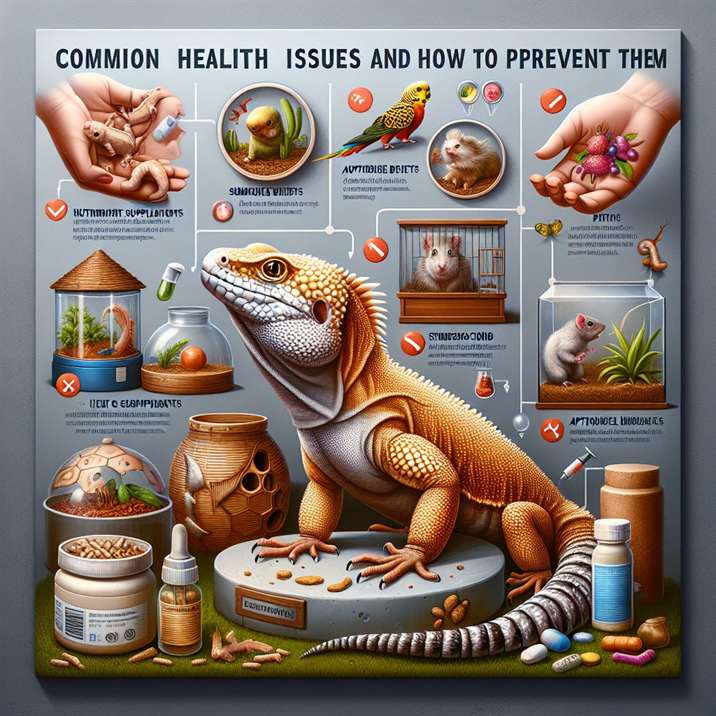Common Health Issues in Exotic Pets and How to Prevent Them
Introduction
Owning exotic pets can be an enriching experience, but it comes with its own set of challenges. One of the most significant challenges is understanding the Common Health Issues in Exotic Pets that can affect the well-being of these unique animals. Recent studies have shown that many exotic pets are at risk for specific health problems that may not be as prevalent in traditional pets like dogs and cats. This highlights the necessity for pet owners to be vigilant and informed.
Imagine bringing home a beautiful parrot or a cuddly ferret, only to find out later that they are prone to certain health issues. It’s essential for any exotic pet owner to be aware of these potential problems to ensure a long, happy life for their furry or feathered friends. From respiratory issues in birds to dental problems in small mammals, understanding these health concerns is crucial for proper care and prevention.
In this article, you will discover various Common Health Issues in Exotic Pets, effective prevention strategies, and essential care tips to keep your beloved companions healthy. We’ll explore the intricate relationship between these pets and their environments, delve into common ailments, and offer actionable advice on how to maintain their health.
So, are you ready to gain insight into the fascinating world of exotic pet health? Let’s dive deep into the common health challenges you might face and learn how to tackle them effectively. Learn more about pet care basics to set a solid foundation for your exotic pet journey.
What is Common Health Issues in Exotic Pets?
Definition
Common Health Issues in Exotic Pets refer to a range of ailments and conditions that affect non-traditional pets, such as reptiles, birds, and small mammals. These issues can arise from various factors, including inadequate care, improper diet, and environmental stressors. Unlike more common pets, these exotic animals may display different symptoms and require specialized veterinary care.
Historical Context
The fascination with exotic pets has grown significantly over the past few decades. Historically, these pets were viewed as novelties, often kept without much consideration for their specific needs. However, as awareness has increased, so has the understanding of the various health issues they face. Today, veterinarians and pet owners are more educated about the needs of exotic pets, leading to better care practices and improved overall health.
Importance of Common Health Issues in Exotic Pets
Awareness of Common Health Issues in Exotic Pets is crucial for pet owners. These issues can severely impact the quality of life of these animals and can sometimes lead to premature death if not addressed promptly. Understanding the signs and symptoms of these health concerns enables owners to seek timely veterinary care, ultimately improving their pets’ health outcomes.
Common Health Issues in Exotic Pets in the Context of Veterinary Medicine
Veterinary practices are increasingly adapting to address the specific needs of exotic pets. This shift has led to the development of specialized training programs for veterinarians focusing on the unique ailments these animals can encounter. By understanding the common health issues in these pets, veterinarians can provide better diagnostic and treatment options.
Key Players or Contributors
A number of organizations and experts are dedicated to improving the health and well-being of exotic pets. These include veterinary associations, animal welfare groups, and research institutions that focus on exotic animal care. Their contributions are vital for developing guidelines, educational resources, and support systems for pet owners.
Explore our comprehensive guide on exotic pet care to deepen your understanding of how to care for your unique companions.

How Does Common Health Issues in Exotic Pets Work?
The Mechanics of Common Health Issues in Exotic Pets
Understanding how Common Health Issues in Exotic Pets manifest is key to prevention. Many health problems stem from the biological makeup of these animals and their specific environmental needs. For instance, reptiles are ectothermic, meaning their body temperature relies on external heat sources. If their environment is too cold or too hot, they can become ill.
Common health issues include:
- Respiratory Infections: Often caused by poor ventilation, stress, or an unsuitable temperature.
- Dental Problems: Common in rodents and rabbits, these can arise from a lack of appropriate chew toys or diet.
- Skin Issues: Conditions like mites or fungal infections can affect a range of exotic pets, often due to unsanitary living conditions.
Technological Foundations of Common Health Issues in Exotic Pets
Advancements in veterinary technology have significantly improved the diagnosis and treatment of common health issues in exotic pets. Techniques such as ultrasound, endoscopy, and advanced imaging allow veterinarians to diagnose conditions that may be difficult to detect through physical examinations alone. These technologies are invaluable in providing accurate diagnoses and effective treatment plans.
Real-World Applications of Common Health Issues in Exotic Pets
Pet owners can apply this knowledge of health issues to improve their pets’ living conditions. For example, maintaining a clean habitat, offering a balanced diet, and providing proper enrichment can prevent many common ailments. Additionally, regular veterinary check-ups tailored to the needs of exotic pets are essential in catching potential health issues early.
To ensure a healthy environment, consider implementing these practices:
- Regular Habitat Cleaning: Keeping the living space clean reduces the risk of infections.
- Balanced Diet: Research the dietary needs of your specific exotic pet to prevent nutritional deficiencies.
- Routine Vet Visits: Schedule annual check-ups with a vet experienced in exotic pet care.
Learn how to improve small mammal pet health to keep your companions thriving.
Common Health Issues in Exotic Pets
Respiratory Diseases
Respiratory diseases are prevalent among various exotic pets, particularly birds and small mammals. Symptoms can include:
- Nasal Discharge
- Labored Breathing
- Coughing or Sneezing
Prevention: Ensure proper ventilation and humidity levels in their habitats. Regularly clean their living spaces to avoid dust or mold accumulation.
Gastrointestinal Issues
Gastrointestinal problems can arise from dietary changes, stress, or infections. Symptoms may include:
- Diarrhea
- Vomiting
- Loss of Appetite
Prevention: Introduce new foods gradually and provide a diet rich in fiber. Monitor their food intake and behavior closely.
Dental Problems
Dental health is crucial for small mammals like guinea pigs and rabbits. Issues can lead to severe pain and complications. Symptoms include:
- Difficulty Eating
- Excessive Drooling
- Swollen Gums
Prevention: Provide appropriate chew toys and a diet that promotes dental wear, such as hay or special dental chews.
Skin Conditions
Skin issues can affect any exotic pet, often presenting as:
- Redness or Irritation
- Hair Loss
- Itching
Prevention: Regular grooming and maintaining a clean environment can help mitigate skin problems.
Parasitic Infections
Parasites like mites and worms can significantly affect the health of exotic pets. Signs may include:
- Weight Loss
- Lethargy
- Skin Irritation
Prevention: Regular veterinary check-ups and maintaining a clean habitat are key to preventing infestations.
How to Prevent Common Health Issues in Exotic Pets
Nutrition and Diet
Proper nutrition is foundational to preventing health issues. Make sure to:
- Research specific dietary requirements for your type of exotic pet.
- Provide a balanced diet that includes fresh fruits, vegetables, and appropriate pellets or grains.
Environment and Habitat
Creating an optimal living environment is crucial for your pet’s health. Consider the following:
- Temperature and Humidity: Ensure the habitat mimics their natural environment.
- Space: Provide adequate space for movement and enrichment.
Regular Veterinary Care
Routine check-ups are essential for early detection of health issues. Schedule visits with a veterinarian experienced in exotic pet care and ensure your pet is up-to-date on vaccinations and preventative treatments.
Hygiene Practices
Keep your pet’s living area clean to prevent disease. Regularly:
- Clean cages or habitats.
- Change bedding and provide fresh water daily.
Future Trends in Exotic Pet Care
As the popularity of exotic pets continues to grow, so does the need for increased awareness and education regarding their health. Future trends may include:
- Telemedicine: Virtual consultations can provide easier access to veterinary care.
- Innovative Products: Development of specialized diets and healthcare products tailored to exotic pets.
- Increased Research: Continued studies focusing on the health and well-being of exotic pets will lead to better understanding and care practices.
Conclusion
Being a responsible exotic pet owner requires dedication, knowledge, and proactive care. Understanding the Common Health Issues in Exotic Pets and implementing preventive measures are essential steps in ensuring your pets lead healthy, happy lives. By staying informed and working closely with veterinary professionals, you can navigate the challenges of exotic pet ownership with confidence.
Remember, the health of your pets ultimately depends on the care and attention you provide. Find more tips on caring for small mammals to enhance their quality of life. Your exotic friends deserve the best, and with the right information, you can offer them just that!
Resource Links:
- bornfreeusa.org: Exotic animals pose serious health risks to humans. Many exotic animals are … avoid all contact with reptiles and not possess them as pets. Protect …
- pmc.ncbi.nlm.nih.gov: Education and preventive medicine practices can be applied to reduce the risk of contracting a zoonotic disease by veterinarians, their staff, or owners of …
- westminsterveterinarygroup.com: As exotic pets, birds require specialized care and attention to ensure their well-being and happiness. One of the most common issues pet bird owners face is …




0 Comments